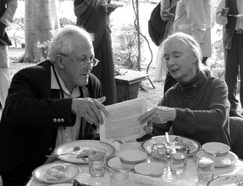| 
ABOVE: George Ellis with Jane Goodall
“I had the privilege to participate in several public events associated with SSQ and I was particularly impressed with the diversity of the people who attended these events and with whom I interacted directly. . . . They were united by a desire to understand more about something they considered to be an important issue for them personally. For many, there was genuine surprise and satisfaction that leading scientists could also be people of deep religious and spiritual conviction. Witnessing to this truth was, perhaps, the most valuable outcome of SSQ.”
— William D. Phillips, Nobel Prize winner in Physics
| | |  | Science and the Spiritual Quest II (SSQ II) was an international program conducted by the Center for Theology and the Natural Sciences in Berkeley, California, in collaboration with several partner organizations. Through private workshops and major public conferences around the world, SSQ promoted dialogue among leading scientists on the connections between their scientific pursuits and their religious or spiritual practices. Science and the Spiritual Quest (SSQ) did not advocate a particular religious position or a specific outcome for discussions between science and religion. It sought merely to promote open and authentic dialogue on this topic within the scientific community, and to make the insights and questions resulting from these discussions available to the public through conferences, publications and multimedia.
Allan Sandage has a planet named after him and a class of variable stars. He has won the Gruber Prize and the Bruce Medal, the highest awards in his field. This is not surprising, though, as he is one of the world’s leading astronomers, responsible for some of the standard textbook fare that makes up introductory courses in astronomy. What is surprising about Sandage is that he is profoundly religious, and very interested in the rigorous execution of his science. More surprising, even to Sandage, is that this interest is shared by so many of his fellow cosmologists.
At an unusual conference in 1998, sponsored by the University of California at Berkeley physics department, cosmologists interested in the spiritual implications of their work gathered. Many who attended, including Sandage, discovered for the first time that some of their well-known colleagues shared these interests. Sandage was heard to exclaim repeatedly: “We have been together for 20 years—I never knew you had any interest in religious questions!”
How is it that scientists working closely together could be so unaware of their mutual interest in spiritual matters? And how widespread are these interests in the scientific community? How accurate is the public perception that science and religion are completely at odds with one another?
 The Science and the Spiritual Quest project (SSQ) launched in 1995 brought internationally distinguished scientists together to tell their own spiritual stories, and to affirm that their scientific research had not undermined their own personal faith commitments. The director of the project, philosopher Phillip Clayton, Ingraham Chair at Claremont School of Theology, is convinced that SSQ reassures religious believers who often have a “fear verging on paranoia” of how science undermines faith. “If you demonstrate, however, that leading scientists are eager to reflect on these important issues, draw lines, and be guided by religious wisdom, you take away that cause for fear,” says Clayton. The Science and the Spiritual Quest project (SSQ) launched in 1995 brought internationally distinguished scientists together to tell their own spiritual stories, and to affirm that their scientific research had not undermined their own personal faith commitments. The director of the project, philosopher Phillip Clayton, Ingraham Chair at Claremont School of Theology, is convinced that SSQ reassures religious believers who often have a “fear verging on paranoia” of how science undermines faith. “If you demonstrate, however, that leading scientists are eager to reflect on these important issues, draw lines, and be guided by religious wisdom, you take away that cause for fear,” says Clayton.
SSQ took direct aim at the near universal cultural perception that science and religion are at war. Popular media images of Galileo, Darwin, and Scopes have them forever under assault for their scientific views, despite unheeded scholarly opinion to the contrary. These images are effectively countered, says Clayton, simply by having “famous scientists speak about the compatibility of science and religion.” When such scientists, including Nobel laureates, go public with their faith stories, the results are both surprising and newsworthy. William D. Phillips, Nobel laureate in physics and SSQ scientist, noted that “there was genuine surprise and satisfaction that leading scientists could also be people of deep religious and spiritual conviction.”
|